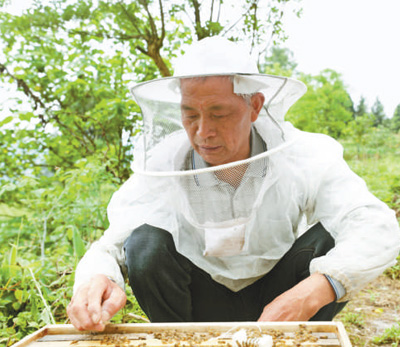Chongqing-based senior achieves dream of reducing poverty via apiculture
p.china.org.cn by Ye Kai,December 22, 2020 Adjust font size:

Wang Zhenliu examines a beehive in an orchard. [Photo by Chang Biluo/People’s Daily]
Wuling mountains region inhabitant Wang Zhenliu’s thick and powerful hands, resolute face, and strong back belie the fact that he is currently 70 years old. The Shengdi community, Qianjiang district, Chongqing municipality resident has become well-known for transforming from an impoverished 65-year-old farmer into a prosperous beekeeper.
Wang used to work as a migrant laborer, and he and his family members led decent lives. Many difficulties began to emerge as time progressed, however, such as their son being unable to work as a result of a disability and his wife’s contraction of a chronic disease. The father ultimately returned to his hometown and began growing corn and raising pigs and chickens on about one-fourth of a hectare of land. He was unable to support his family with the less-than-2,000-yuan (US$295) of income that he earned per year though, and the household was identified as impoverished in 2014.
Wang eventually decided to buy two hives of bees in order to attempt to increase his income by engaging in apiculture. He underestimated the difficulty of the undertaking, however, and began spending his timing pacing around his village after his bees flew away.
In 2015, Wang received a phone call from poverty relief official Zhang Xiaohua that changed his life while he was taking the bus to a nearby town to look for a job. The government employee asked him if he wanted to participate in special beekeeping classes that the Qianjiang poverty alleviation office designed for members of impoverished households. Wang expressed interest and immediately headed home.
Wang bought six hives of bees for a total of 4,000 yuan (US$591) with a combination of more than 2,000 yuan (US$295) of borrowed funds and some of his own money after his first week of training and took the insects to a rapeseed field so they could enjoy the end of the bloom that was in effect at the time. The new hives did not fly away, but five of them died as a result of a sudden drop in temperature.
Wang’s wife advised him to discontinue his apiculture pursuits, but he was determined to proceed. He kept the books that he got at his training classes in hand during meals and often sought advice from several major beekeepers in his area. Wang also bought a smartphone so he could study online and ask for advice on WeChat. The aspiring apiculturalist gradually gained an understanding of beekeeping techniques and the animals’ habits.
Wang expanded his apiary to eight hives later in 2015 and maintained 18 by the end of the year. He received 2,000 yuan (US$295) of industry-oriented poverty reduction funding in 2016 and borrowed 10,000 yuan (US$1,477) from friends and family, which made it possible for his collection to increase to 54 hives. The honey producer brought in a total of 80,000 yuan (US$11,816) of income selling more than 350 kg of the substance that year.
“My life became as sweet as honey,” Wang mentioned when reflecting on the 200,000 yuan (US$29,540) that he earned in 2017 after he expanded his bee yard to 205 hives.
The apiculturalist also spent time learning about various flowering trees and plants and their bloom cycles and currently rotates his bees between four or five different locations. Wang’s hives spend about six months of the year in higher-altitude areas so they can feast on the blossoming trees that grow in them, such as Chinese sumacs, and he moves them to lower elevations when trees there are in bloom. The bees also feed on rapeseed fields from spring until the start of winter.
Wang established an apiculture cooperative after he escaped from poverty with 100,000 yuan (US$14,770) of funding that he received from the local government and began teaching impoverished farmers how to keep bees and providing them with assistance in order to help them become more prosperous. Membership gradually increased and all of the 25 households that became involved with the organization ultimately escaped from poverty.
In 2019, Wang won the national poverty alleviation role model award, which made him even more determined to continue with the endeavor.
Recently, Wang has been planting loquat and plum trees across two-thirds of a hectare of land in order to implement a modern agricultural model involving “flowers + fruit + honey + apiculture” and provide more sources of nectar for his bees.
“Life was bitter in the past, but now I have dropped into the honeypot,” Wang sighed while sitting on a bench with his wife enjoying the afternoon sunshine. He wiped the corner of his eyes. His wife smiled.
3ce9f019-6022-4bd3-8f23-21578fe4c45c.png)